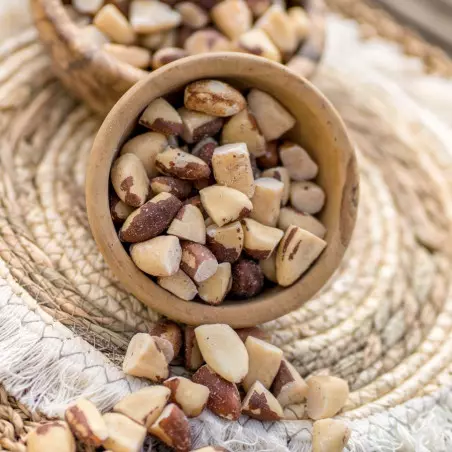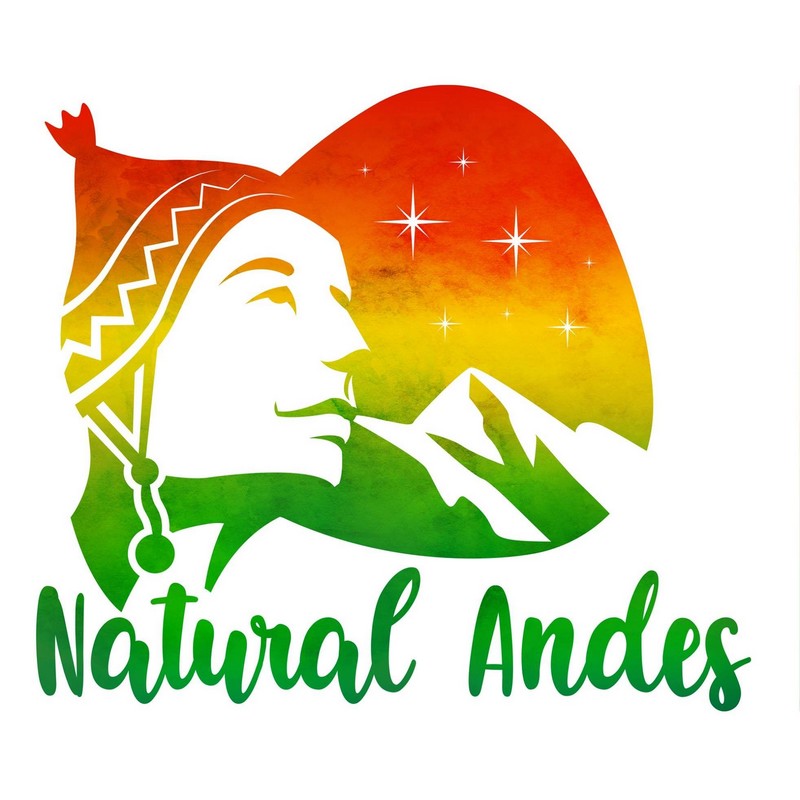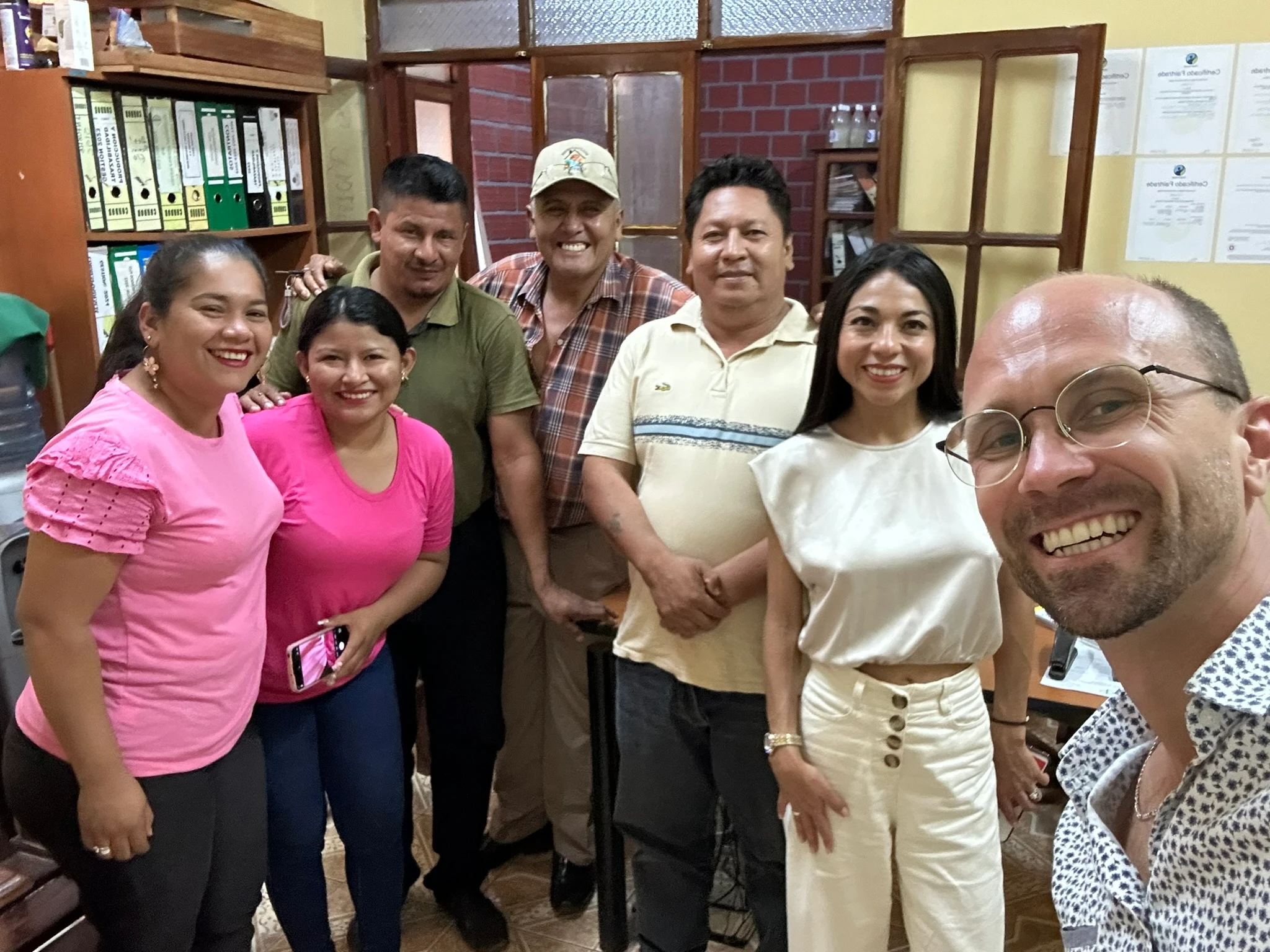- Out-of-Stock















Organic Amazon nuts (= Brazil nuts), in nuggets
Fair harvest and processing in Bolivia
1 kg bag
Amazon nuts originate from the primary forests of South America and are known for their unique lipid profile and richness in minerals, particularly selenium (4.6 mg/kg). Formerly known as "Brazil Nuts," their production drastically declined in Brazil due to deforestation since the 1970s. Bolivia became the main producer, and they were renamed "Amazon Nuts".
Their taste, between almond and macadamia nut, allows them to pair well with both sweet and savory dishes. Their texture is crunchy, and the half-nut format that Biovie offers is the ideal size for easy snacking or adding to your recipes without even cutting it. Very useful for making your own plant-based milk, creams, and cheese alternatives.
> On our blog, you will find a recipe for Raw Bread with Brazil Nuts, and tips on how to make homemade plant-based milk.
🤎 Why nuggets and not whole nuts?
Our partner Natural Andes has created a truly innovative and ethical supply chain around the Amazon Nut nugget. To support artisanal work and the local population, they have chosen hand-shelling. Manual shelling results in breakage, making these slightly damaged nuts unappealing to most large exporters. Yet, they are very good!
Each broken nut is beautifully recut by hand by the Bolivians of Riberalta. Their size varies between that of a hazelnut and a large almond. The nugget offers only advantages:
- Anti-waste:
Damaged nuts during shelling are downgraded, but by valuing these losses, we can save 15% of the annual production. The nuggets are thus the result of the upcycling process.
- Job creation:
The manual cutting of broken nuts creates a new job. Today, 20 people are employed solely to manually cut each nut.
- More convenient to consume:
Consumers prefer it for its size, which is more suited to their needs, unlike a whole Amazon nut. The size of a hazelnut, the nugget can be consumed more easily in one bite, mixed in muesli, yogurt, or in a mix of dried fruits.
🤎 Still Wild Nuts
Amazon nuts are among the rare nuts that are not cultivated; they are collected from the heart of the Amazon rainforest. Indeed, the nut ripens at the top of century-old trees, up to 50 meters high. Amazon nut trees need their natural ecosystem to develop. Like chestnuts, it is up to humans to collect the fruit that falls from the tree. It resembles a large coconut and contains 10 to 25 nuts. The husk is opened at the foot of the tree with a machete, and the triangular-edged nuts are extracted from the forest to be shelled.
The collection of Amazon nuts helps preserve the Amazon from deforestation.
> Discover the harvest in images in this video:
🤎 An ethical and sustainable production
While Amazon nuts cannot be cultivated, their processing is becoming industrialized, mechanized, and threatens the livelihoods of families in Bolivia: hundreds of jobs are being cut. The local population depends on the manual shelling activity for their livelihood, so it is important for us to continue supporting them. Moreover, the reprocessed nuts limit waste and allow for innovation among organic stakeholders.
🤎 Amazon nuts are important foods for their contributions of unsaturated fats, fibers, and nutrients.
Selenium: it is the vegetarian star of selenium intake! This powerful antioxidant essential to the human body strengthens the immune defenses and balances thyroid hormones. It is crucial for the production of an enzyme, glutathione peroxidase, which acts in the antioxidant mechanisms of cell membranes.
After analysis, Natural Andes Amazon nuts indicate a level of 4600 µg/kg. According to EU standards, this corresponds to 70 grams of nuts, or between 10 and 15 Amazon nuts per day (and thus double for the nuggets).
Vitamin E: it is also a very good antioxidant that limits the effects of free radicals on the body. Vitamin E derivatives have cyclooxygenase activity that brings an anti-inflammatory effect. There is also a protective effect against atherosclerosis (atheroma plaques in the arteries) and thus a reduction in risks related to cardiovascular diseases.
Selenium coupled with vitamin E may have a preventive action against certain cancers, mainly prostate cancer.
Magnesium, zinc, and phosphorus: essential components of many mechanisms in the body, they affect mood as well as the strength of bones or teeth, immunity, skin sebum regulation, and blood clotting.
Lipid Profile: The Amazon nut is rich in lipids, containing a majority of polyunsaturated fatty acids (22% monounsaturated and 25% polyunsaturated) compared to 16% saturated fatty acids (notably palmitic acid and stearic acid). The consumption of unsaturated fats seems to improve the sensitivity of cells to insulin (a hormone that regulates blood sugar levels) and thus reduce the risk of type 2 diabetes. They also allow for better regulation of cholesterol levels in favor of HDL (the "good" cholesterol).
Fiber: They regulate the digestive system and the duration of intestinal transit. They provide a feeling of fullness that can be interesting if one is looking to limit caloric intake. Finally, they slow down the absorption of carbohydrates by the body.
Climate-wise, the Amazon nut has a good carbon yield!
According to the Life Cycle Analysis (LCA) conducted with the Natural Andes sector, the Amazon nut emits 0.77 kg CO2 equivalent (EQ)/kg*, which is almost the same rate as the Grenoble walnut cultivated and produced in France (0.75 EQ/kg). The production method in its natural environment reduces the impact of greenhouse gases, and transportation represents only 30% of the carbon footprint.
Moreover, since the Amazon nut tree is a protected species, its exploitation contributes to the conservation of millions of hectares of Amazon rainforest and prevents deforestation and intensive soybean cultivation for livestock, as is the case in Brazil.
* 1kg of meat = 20.18 (EQ)/kg
🤎 To learn more, check out our blog article: What are the benefits of Brazil nuts?
NATURAL ANDES

This project first emerged from the meeting of Maxime Chiquet with the inhabitants of Bolivia, with whom he lived for over 5 years. During his travels, he met small producers who still work in an artisanal way and respect traditions. Their story touched him, particularly the fact that they are no longer valued in favor of industrializing productions.
Then from the meeting with Jhomaira Vera, his wife, with whom he decided to create Natural Andes with the aim of valuing Life, the Earth, and Humanity. Their commitment is based on preserving the values of Humanity respectful of its land, Pachamama (Mother Earth). Authentic Bolivian culture is respectful of the Earth, but industrialization threatens the nobility of sustainable ancestral practices, which preserve the future and economic security of producers.
Their raison d'être: authenticity. Their action: 100% organic endemic products sourced from sectors leaving a positive impact on their production land.
Beyond organic and fair trade, their commitment to producers is established at 3 levels:
- Sustainability of production activities.
- Economic security for the local population.
- More equitable distribution of wealth.
The pursuit of Authentic Terroir: it is about preserving Humanity and its Land.
> You can find an article on the Natural Andes website about the logistics of their supply chain as well as the Harvest Calendar in Bolivia.
- Ingredients: 100% Amazonian nuts from organic farming, in pieces (half-nuts).
- Packaging: 1kg packaged under protective atmosphere.
- Storage: Keep dry and cool, preferably in an airtight container.
Ces produits pourraient vous intéresser